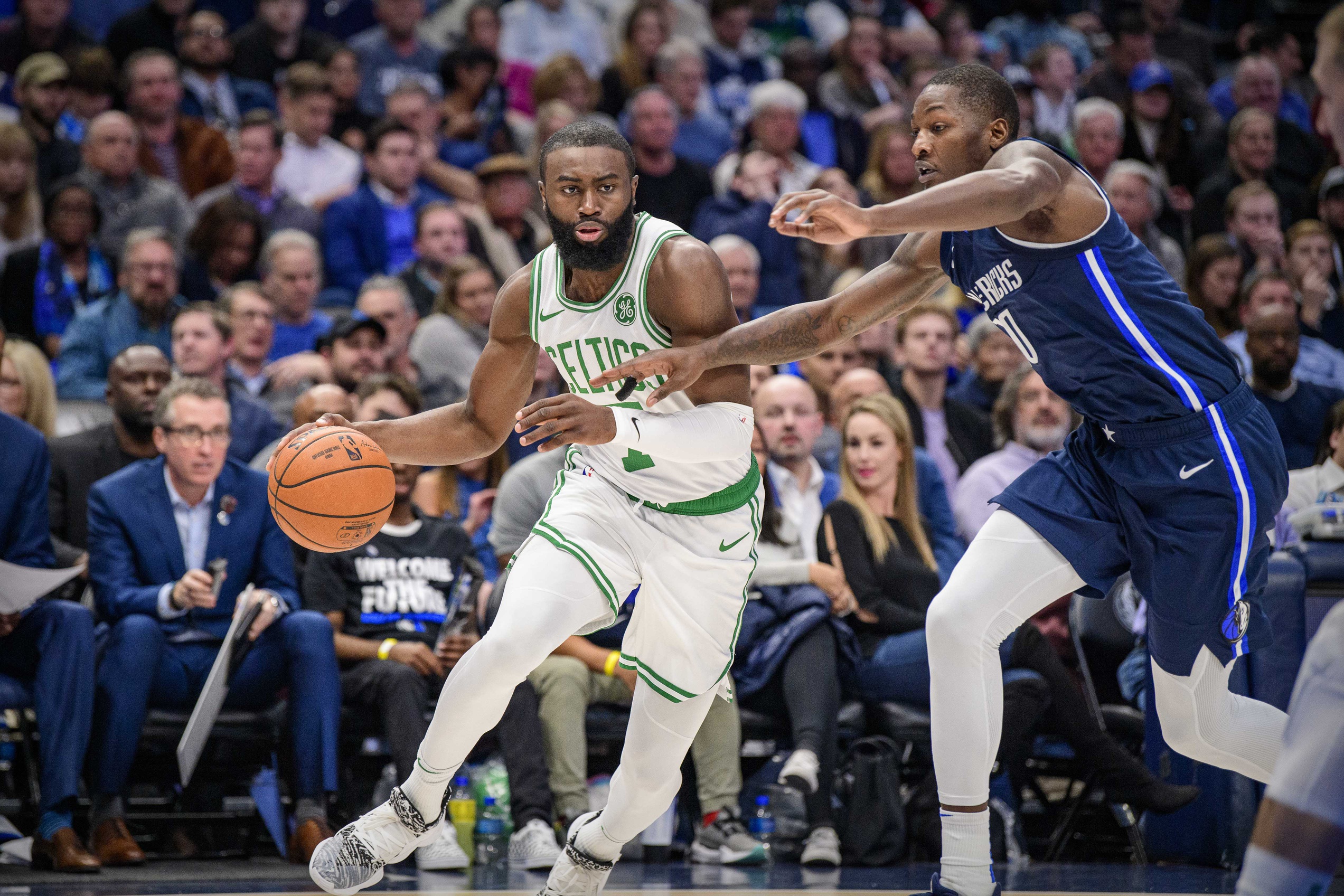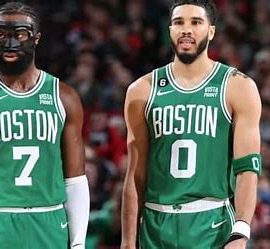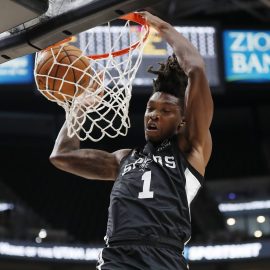Every morning, we compile the links of the day and dump them here… highlighting the big storyline. Because there’s nothing quite as satisfying as a good morning dump.
Brown was quoted in a Dec. 16 Heavy.com story saying Irving was “undeserving” of the blame for last year’s disappointing season, and instead said the “organization and coaching staff” should shoulder most of the blame.
Brown refuted those comments before Wednesday night’s game against the Mavericks, saying his statements were mischaracterized.
“I think it was a misquote, for sure, but to be honest I’m tired of talking about it and tired of being asked about it,” he said. “It definitely, I would say, was a misquote. It didn’t come off the way I said it, the way it was written with a narrative where [the writer] already wrote the story the way he wanted to write the story but it definitely wasn’t intended in that manner. But I’m tired of being asked about it to be honest.”
WEEI reached out to Brandon “Scoop B.” Robinson yesterday to get his take on Jaylen’s notion that he was misquoted (notably, the Heavy.com piece was presented as a transcribed interview). Robinson apparently ran into Jaylen Brown at a high school basketball tournament in the Barclays Center where Robinson was doing color commentary. He sat down with Brown during halftime of the game, and recorded the interview and apparently transcribed it later. The problem is that Brown’s comments about the front office are almost completely drowned out by the halftime entertainment.
Robinson insisted that he quoted Brown accurately, and said that he understands why Jaylen would try to ‘walk back’ his comments.
So, did Robinson misquote Brown?
Who knows.
I think it’s entirely possible that Robinson missed a few words that would’ve changed the character of Brown’s comment somewhat. However, in the clip that WEEI posted (around the 2:30 mark in the audio), you can hear Brown go straight from talking about guys who ‘couldn’t take a step back’ to talking about the front office, and if Brown included himself in the blame for last season’s disappointment, it came after he blamed ‘other guys’ and the front office.
While I think Robinson got Brown’s quote more or less accurate, I don’t think Robinson’s quite right in implying that Brown’s trying to walk back what he said in order to smooth things over with the front office and coaching staff—because I don’t think the C’s front office and coaching staff are overly concerned about a 23-year old guy speaking incautiously. Ultimately, if the C’s coaches and management were the kind of people who sat around dissecting news reports, Boston would be mired at the bottom of the league, and they probably wouldn’t have drafted Brown in the first place.
Page 2: Where we don’t know what’s wrong with Hayward’s foot and Marcus is quarantined
In the case of Hayward, Ainge described the wing as “day-to-day” with a “foot issue.” At this point, that’s all they know. Ainge said that the issue came up while he was working on his return from other injuries.
“He was doing a lot of training and being able to work and he just has a toe/foot — it’s right there, right where your toe connects with your foot,” Ainge said. “It’s just some pain and we’re trying to figure out what it is. He had a cortisone shot, hoping that would make it better, but it actually made it worse. So we’re trying to figure all that out. Nobody knows exactly what the issue is.”
That’s always good news—a team of specialists doesn’t know what’s wrong with a part of the anatomy in which they specialize.
Meanwhile, checking in on Marcus Smart who does not have pink eye:
Ainge clarified that Smart does not have pink eye and that it’s part of a “viral” issue that’s kept him off the court and stuck in bed the past couple weeks.
As things stand, Ainge predicted that Smart could be back on the court on Christmas Day. However, he stressed that it was “just a guess.”
“He was just quarantined at home. But he’s been getting better. I’ve been talking to him every day. I’m hoping that he’ll be healthy — he hasn’t played basketball or even been out of bed much over the last week, 10 days, so we need to get him back out on the court, sweating and making sure he’s healthy and feeling good.”
Yikes.
The Hospital Celtics are back, baby.
Finally: Jaylen Brown has thoughts on education
In other Brown news, Jaylen chose Cal-Berkeley over Calipari in no small part because he valued the academic tradition there. He didn’t have much of a say in where he started his pro career, but he’s definitely taken advantage of the academic connections that playing in Boston has given him:
Oakes explains how publicly defining and separating students by their apparent intellectual capabilities generates damaging and unfair consequences. As Brown combed through terms such as social stratification (the system of categorizing people based on socioeconomic factors) and curricular tracking (the practice of grouping students based on their perceived ability), he couldn’t help but cry.
Learning concepts in high school that don’t apply to the real world wasn’t a coincidence, he realized. Memorizing facts and figures solely for the purpose of regurgitation wasn’t how everyone treated information, he realized. Those circumstances were by design.
Oakes introduced Brown to how schools structure inequality.
“I experienced a lot of the stuff she was talking about, and I had no idea,’’ Brown said. “I consider myself a smart guy, but once you learn somebody has been outsmarting you your whole life, it kind of sucks to realize. That made me kind of emotional.’’
This is an interesting subject—and since it’s a slow news day, I’m going to talk a bit about Oakes’ notion of ‘structured inequality.’
I saw a teacher talking once about how he transferred from a high scoring school in a socially stable neighborhood to a low-scoring school in a poor neighborhood. From one year to the next, the standardized test scores of his pupils plummeted.
His take on it, “I did not go from being a good teacher to a bad teacher overnight.”
Oakes is absolutely right about structured inequality: A central component of public education from its very beginning in early modern Europe is the notion of guided outcomes. Yes, some systems (Scotland’s and Germany’s for instance) were more meritocratic than others (Britain and France), but recognition of superior ability among lower-class students has always been haphazard, and educational opportunities have always been stratified.
There never was a golden age from which the current system has fallen. The system has always been about reinforcing the established order of things.
Have you ever stopped to wonder why you were taught cursive? Did you know that there are other ways of performing both multiplication and division?
You were taught cursive because it’s the fastest way to write by hand. You were taught tabular multiplication and ‘long division’ because they are the most compact methods of doing calculations by hand.
You were taught these things in order to qualify you for a career as a clerk.
Absent any particular characteristics that caused you to stand out from the crowd, your teachers were preparing you—most of them without even knowing that they were—for a career appropriate to your social standing.
Likely you’ve seen scoffing about common core math education, and honestly, it deserves a pretty significant amount of ridicule, but not for the reasons you may think.
You may think that you were taught arithmetic, but unless you can explain why you start from the left when you do long division, or why you ‘carry’ numbers into adjacent columns when multiplying, you didn’t learn anything about arithmetic at all. You just learned a few rules and how to apply them. You learned what you needed to know in order to have a middle-class job. No more, no less.
Common core is an attempt to actually teach mathematics instead of teaching rules. However, the entire primary and secondary educational system has been, from its very inception, about teaching rules. This focus on rules is inherent in the system, and these rules are, ultimately about fostering an orderly society. And an orderly society is a stratified society.
But there’s more to it than that. I was a substitute teacher for a couple years. I didn’t take many assignments because I found that teachers, in general, did not leave adequate materials behind for subs.
However, one experience has stuck with me. I was subbing at a middle school in a rather poorer section of Sioux Falls. The school day started off with a fifteen minute homeroom in which we turned off all the lights and watched part of a movie.
You didn’t have to be a Rhodes scholar to understand that this session was intended to quiet these kids down and get them more or less ready for classwork. And, believe me, these kids needed help in settling down for class.
As a group, these kids were coming from chaotic households, as compared to more affluent neighborhoods. Before they walked in the door, generally speaking, these kids were behind their peers in better neighborhoods. The teacher whose test scores cratered after he moved? He was suddenly teaching students who had more obstacles to learning.
So even if you stripped the educational system of its focus on engineered outcomes, you would still see stratified results because these kids are in school for what? Seven hours a day? Where are they the other seventeen? Now just based on raw numbers, what is going to have the most meaningful impact on the kid’s development: The handful of hours he spends in a controlled environment being taught, ostensibly, the same material that everyone else is being taught regardless of income, or the time he spends in an environment demonstrably inimical to education?
Through his fellowship, Brown is in the process of creating an educational program designed to provide opportunities for students that might not realize they’re at risk of being victims of the system.
Brown’s program is in the early stages, but he has visited several local community centers and Boys & Girls Clubs to begin selecting students and building a staff. He wants to empower kids and teenagers with the necessary knowledge and resources so that they can alter their social mobility and break down barriers.
“I’m just an advocate of my own experiences and things that I’ve seen,’’ Brown said. “I’ve been blessed to be able to attend university to help me put terms with the pain and the distress I’ve seen and felt growing up.’’
I admire Brown’s enthusiasm, but I don’t think he realizes that a world without a stratified educational system is necessarily a world without a Harvard, without an MIT, without a UC-Berkeley. A system that generates winners and losers is always going to empower some of the winners to help some of the losers. The heady air of Cambridge, Massachusetts—and its namesake, Cambridge, England—is possible only under a system that funnels ‘losers’ into their proper roles in society.
Add The Sports Daily to your Google News Feed!





